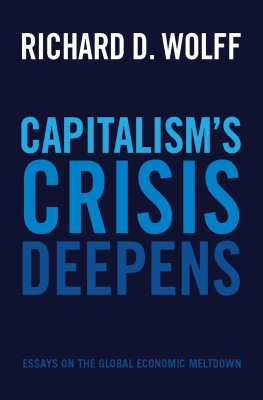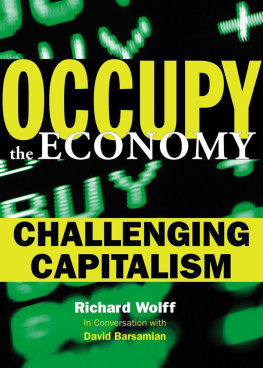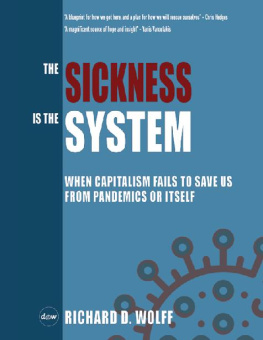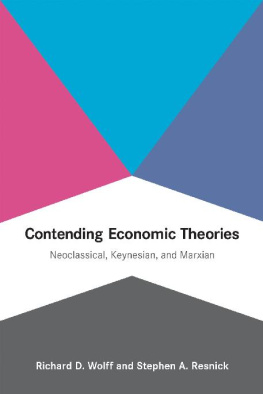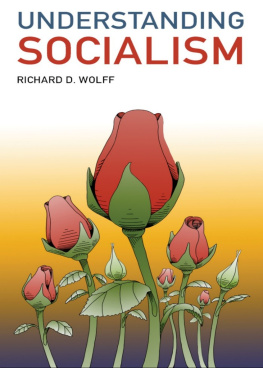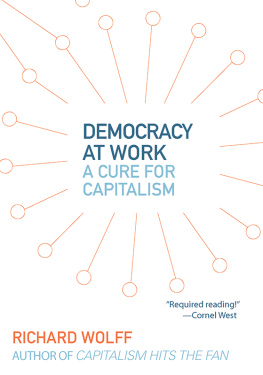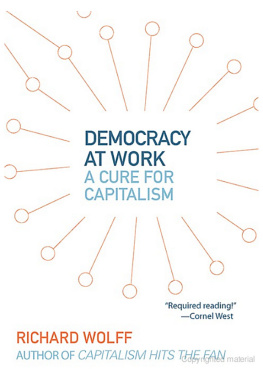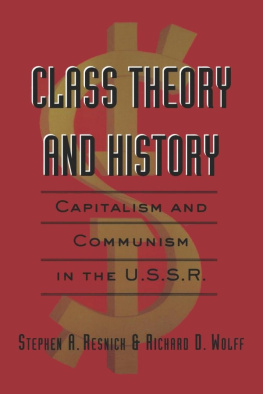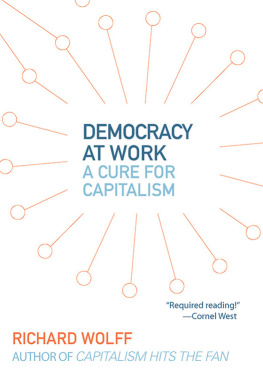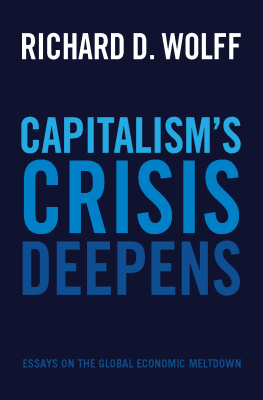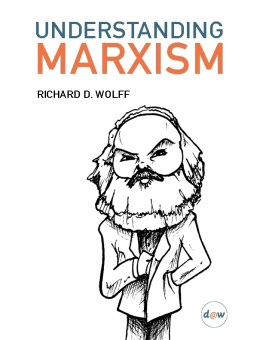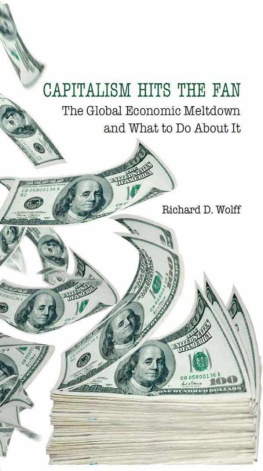Capitalisms
Crisis
Deepens
Capitalisms Crisis Deepens
Essays on the Global Economic Meltdown 20102014
Richard D. Wolff
Edited by Michael L. Palmieri and Dante Dallavalle
Chicago, Illinois
Haymarket Books
2016 Richard D. Wolff
Published by
Haymarket Books
P.O. Box 180165
Chicago, IL 60618
773-583-7884
info@haymarketbooks.org
www.haymarketbooks.org
ISBN: 978-1-60846-655-9
Trade distribution:
In the US, through Consortium Book Sales and Distribution, www.cbsd.com
In the UK, Turnaround Publisher Services, www.turnaround-uk.com
In Canada, Publishers Group Canada, www.pgcbooks.ca
All other countries, Publishers Group Worldwide, www.pgw.com
This book was published with the generous support
of the Wallace Action Fund and Lannan Foundation.
Cover design by Josh On.
Library of Congress CIP Data is available.
Contents
Preface
The second worst crash of global capitalism in seventy-five years continues, approaching its tenth year. The so-called recovery since 2009 has bypassed the lower 90 percent of the people and left them further below the top 10 percent. Those who gained the most wealth in the last half-centurythe very people most responsible for bringing on the crashare the only ones now recovered. Those who gained the most wealth in the last half-centurythe very people most responsible for bringing on the crashare the only ones now recovered. The government bailouts they sought and obtained quickly in the dark days of late 2008 benefited mostly them. The weakness, slowness, and partiality of the recovery both reflect and worsen growing economic inequality. To preserve their accumulating wealth, large corporations and those they enrich wield ever more undemocratic power over the political and cultural realms of society. Their goals are self-preservation and self-aggrandizement.
These features of capitalism are all social failures in terms of justice, democracy, equality, liberty, and ecological sanity. Yet mainstream media, politicians, and academics doggedly act and speak as though capitalism were the obviously optimal system to be continued, reinforced, and celebrated. By proceeding as though we are not in fact experiencing capitalisms systemic failures, they perform their ideological assignments.
They also proceed as though either no alternative systems exist or the alternatives merit no discussion and debate. What problems of capitalism are even admitted are then quickly buried under mountains of commentary on the finer points of this or that fiscal and monetary policy presumed adequate to solving them. Questioning the capitalist system, let alone discussing system change, simply does not occur to mainstream academics and the journalists and politicians they trained. Such discourses are repressed.
The importance of publications like Capitalisms Crisis Deepens lies in their reinsertion of repressed discourses into public conversations. The once robust debates over capitalism and alternative economic systems were never settled in the Cold War or by the implosion of the former Soviet Union. They were only temporarily submerged first by anticommunist hysteria and then, after 1989, by delusional capitalist triumphalism. The 2008 crash of global capitalism reopened the space for those debates to resume. Now however, they have to take account of the many changes within capitalism, socialism, and communismconceptual as well as practicalover the last half century.
The essays gathered here engage those debates on their changed terrain. They include many written after September 2014, when democracy@work published an e-book of my essays, Capitalisms Crisis Deepens: Essays on the Global Economic Meltdown, 20102014 . Interest in alternatives to capitalism grows rapidly now much as popular support for capitalism wanes. The essays in this book both respond to and seek to advance and develop this remarkable shifting of ideas and ideological positions.
Richard D. Wolff
September 2015
Part I: Crisis Capitalism
The ramifications of the global effects of the crisis that began in 2007 continue to unfold. Eight years into the crisis, the social and economic costs keep mounting. Levels of unemployment and poverty remain high, wealth and income inequalities worsen, and the housing market remains depresseda significant indicator when one considers that for most Americans, their homes are their single largest asset. The only recovery since the massive bailout programs has been in the stock market, big corporations profits, and the portfolios of the top 10 percent of income earners. Recovery has bypassed the vast majority of Americans. The idea that the United Statess economic system is exceptional has imploded. Fading fast, the American Dream of upward mobility is giving way to an ever-harder struggle just to make ends meet.
In spite of this, business and political leaders continue to defend capitalism and rigidly restrict their debates mostly to modest reforms and the endlessly repeated arguments for more or less government intervention in the economy. Opinion shapers refuse to consider that the causes for todays economic crisis are structural and recurring. Meanwhile, large segments of the public are beginning to understand that capitalism itself has been brought into question because of the depth and duration of the crisis since 2007.
The essays in Part I explore the depths of the crisis and specifically the interaction of economic stresses with political and cultural changes. Together, these essays sketch the contours of the major, long-term changes in capitalism that underlie this crisis and explain why it cuts so deep and has lasted so long.
Capitalist Crisis and the Return to Marx
March 18, 2010
Marxian analyses are now resurfacing in public dialogues about economy and society. A generation of marginalization is fading as a new generation discovers the diverse richness of the Marxian traditions insights. Just as an economic crisis in 1848 helped provoke and shape Marxs original insights, todays crisis helps renew interest in Marxism.
In the century before the 1970s, the victims of capitalisms recurring crises and its critics increasingly turned toward the work of Marx and other Marxists. The Marxist tradition of social analysis therefore spread widely and deeply across the world. As it interacted with many different cultural, political, and historical contexts, the tradition developed multiple, differentand sometimes sharply contestedinterpretations or versions of Marxist social theory. Marxism became the richest available accumulation of critical analyses of capitalism and of critical engagements with the theories that supported capitalism. It gathered the theoretical and practical lessons drawn from successes and failures of political movements more or less inspired by Marxism. Today it is an invaluable resource for theorists of and activists for social change beyond capitalism.
Capitalisms defenders have mostly sought to repress, ignore, or otherwise marginalize Marxism and Marxists. While often successful, their efforts could only slow and punish Marxisms advances in the century before 1975. Unevenly yet relentlessly, the tradition grew. From a handful of theorists and activists, Marxism spread to Marxist labor unions; political parties; newspapers; research institutes; local, regional, and national governing regimes; and internationals. It also generated internal differences, debates, and conflicts, mostly peaceful but sometimes violent, among its constituent tendencies.

